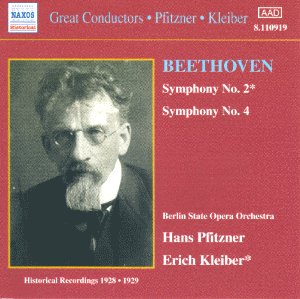BEETHOVEN
Symphony No. 2
Berlin State Opera O/Erich Kleiber
First issued 1929
Symphony No.4
Berlin State Opera O/Hans Pfitzner
First issued 1928
NAXOS HISTORICAL 8.110919 [62.39]
See
also
Crotchet
BEETHOVEN
Symphony No. 1
Berlin Philharmonic O/Hans Pfitzner
First issued 1928
Symphony No.6
Berlin State Opera O/Hans Pfitzner
First issued 1930
NAXOS HISTORICAL 8.110927
[63.50]
Crotchet
BEETHOVEN
Symphony No.9
Lotte Leonard (soprano) Jenny Sonnenberg (contralto) Eugene Transky (tenor)
Wilhelm Guttmann (bass) Bruno Kittel Choir Berlin State Opera O/Oscar Fried
First issued 1929
NAXOS HISTORICAL 8.110929
[61.16]
Crotchet
Great Conductors Series

If you are prepared to accept such idiomatic practices of the period as no
first movement repeats, slower trios, some remnants of string portamento
or slides (though not on Kleiber's account) and a distant, muzzy ambience
in exchange for the fascination of hearing recordings from another era and
by conductors other than the ubiquitous Toscanini or Furtwängler, then
these are for you. Nowadays one often falls prey to the view that orchestral
playing has never equalled today's standards. Not so, for there is woodwind
and horn playing of distinction to be found throughout these recordings (this
reviewer came to it having just experienced an equally impeccable live London
performance of the same work by the LSO under Seiji Ozawa).
But there are also moments at various points on all three discs which Rob
Cowan's informative booklet notes disingenuously describe as 'far from immaculate
technically speaking'. Pfitzner's starts can be shaky, his performances may
be erratic but they are also often inspired, his Pastoral storm has an eerily
ominous beginning, the finale has a tempo which brings out wonderful detail
despite an overslow yet riveting introduction. Fried's Ninth is patchy and
he often loses control of the ensemble, but the (today) relatively unknown
singers are all excellent, though the vocal heroes are unquestionably a
distinctly Stormtrooper-style chorus. Quiet orchestral playing sometimes
gets lost under the surface noise (for example when the cellos and basses
first hit upon the famous tune of the finale) and there are some technical
blips (either original or as a consequence of transfer) such as a missing
oboe note at the start of the trio in Pfitzner's account of the first symphony.
Whether the likes of Pfitzner and Fried qualify for inclusion in a series
entitled 'Great Conductors' (Erich Kleiber certainly does) must remain a
matter of opinion. So it's a question of accepting these interpretations
and performances warts and all for what they are, fascinating historical
documents, and for that alone they are highly recommended.
Christopher Fifield
Performance

Recording

